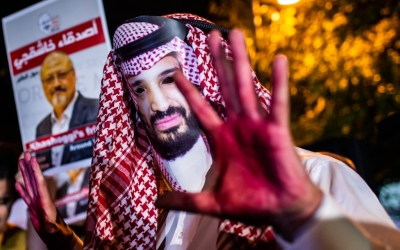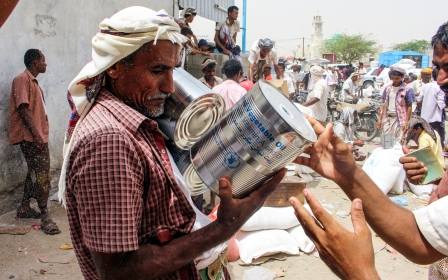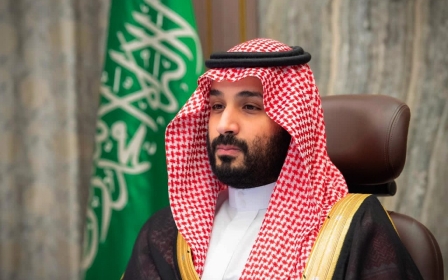'Case closed': Saudi diplomat calls for moving on from Khashoggi murder
Saudi Arabia's envoy to the United Nations has criticised the US intelligence report that accused Crown Prince Mohammed bin Salman of authorising the assassination of journalist Jamal Khashoggi, calling on the world to "move on" from the gruesome murder.
In a series of tweets sent on Monday, Saudi Ambassador Abdallah al-Mouallimi said last week's report by the US Office of Director of National Intelligence (ODNI) does not prove the crown prince's responsibility for the killing "beyond reasonable doubt".
"The Prince courageously accepted moral responsibility, presented the accused to the justice system, and pledged to reform the intelligence organizations," Mouallimi wrote.
"Case closed! Let us all move forward to tackle the serious business of world issues!!"
Rights advocates were quick to assert that the case will remain open until justice is achieved.
New MEE newsletter: Jerusalem Dispatch
Sign up to get the latest insights and analysis on Israel-Palestine, alongside Turkey Unpacked and other MEE newsletters
"The world cannot move on from the Khashoggi murder and it should not move on," UN investigator Agnes Callamard told MEE.
"The case is not closed and will not be closed as long as the masterminds have not been held accountable. The ODNI report is part of our search for justice, of the journey for justice. It is not the end of the journey."
Rejecting US findings
The Saudi diplomat had rejected the rationale behind the US intelligence agencies' conclusion, which was based on the assessment that the operation to kill Khashoggi could not have happened without the crown prince's approval given the involvement of some of his close aides.
"If this is a valid argument why weren't the President, Vice President, and the Secretary of Defense held accountable for the Abu Ghraib crimes?" Mouallimi wrote, referring to the abuse and torture of detainees at a US prison in Iraq in the mid-2000s.
Rights advocates have long dismissed Saudi officials' inclination to cite rights abuses by the West as a form of whataboutism that does not absolve the kingdom of its own wrongdoings.
Mouallimi pushed back against the report's assertion that the crown prince, known as MBS, seeks to silence dissidents abroad.
"Where is this sucking sound that is bringing multiple dissidents home? We all know of some dissidents who have been living comfortably abroad and still do, courtesy of foreign intelligence," he said.
In reality, several Saudi dissidents abroad, such as Montreal-based activist Omar Abdulaziz, have reported attempts to lure them to Saudi diplomatic posts where they live.
Former Saudi intelligence official Saad al-Jabri also filed a lawsuit last year alleging that the crown prince sent a hit squad to kill him in Canada where he resides.
"The 'Tiger Squad' that was deployed to Canada included forensic personnel experienced with the clean-up of crime scenes, who carried with them two bags of forensic tools," the suit says.
"The kill team was thwarted by attentive Canadian border security officials who were suspicious of their behavior at an airport checkpoint."
Khashoggi, a US resident, journalist and prominent government critic, was murdered and dismembered by Saudi government agents at the kingdom's consulate in Istanbul in October 2018.
For more than two weeks, Saudi officials stressed that the journalist had left the building alive before eventually acknowledging that he was killed. Riyadh still maintains that the assassination was a rogue operation that occurred without the approval of top officials.
Last year, the kingdom sentenced eight people to up to 20 years in jail over involvement in the killing without identifying them.
On Monday, Mouallimi said the involvement of top MBS aides in the murder, including members of his personal security team, does not implicate the crown prince. "This is a point in favor of the Prince indicating that even those who may have been 'close' to him have been tried and convicted in court," the Saudi diplomat said.
However, he failed to mention that Saud al-Qahtani, a key MBS adviser who is alleged to be the mastermind of the operation, was not tried or sentenced by the kingdom.
"The 15-member Saudi team that arrived in Istanbul on 2 October 2018 included officials who worked for or were associated with, the Saudi Center for Studies and Media Affairs (CSMARC) at the Royal Court," the ODNI report says.
"At the time of the operation, CSMARC was led by Saud al-Qahtani, a close adviser of Muhammad bin Salman, who claimed publicly in mid-2018 that he did not make decisions without the Crown Prince's approval."
Despite releasing the report, which the previous US administration withheld against legally-binding requests from Congress, President Joe Biden opted against imposing sanctions on Saudi Arabia.
The US government imposed additional sanctions on Saudi individuals connected to rights abuses, but the failure to go after MBS personally left many rights and press freedom advocates disappointed, especially that prior to his election Biden had called Saudi Arabia a "pariah" state.
Calls for MBS sanctions
"There is no legal, moral or logical reason to apply sanctions to the lower-level players in this conspiracy, who were following orders, while letting the criminal mastermind get away without consequence," Washington Post publisher Fred Ryan wrote in an op-ed published on Monday.
"In fact, it’s contrary to the American system of justice, which always works to go up the chain of responsibility to land the person ultimately accountable for serious crimes."
But the US administration says it aims to "recalibrate" not "rupture" ties with Saudi Arabia.
Officials say the decision against penalising MBS was taken after an internal debate, which came to the conclusion that sanctions on the crown prince would fracture relations with the kingdom.
Still, White House spokeswoman Jen Psaki has been making the false assertion that the United States does not impose sanctions on the leaders of countries with which it has diplomatic relations.
'The case is definitely not closed'
- Raed Jarrar, DAWN
"Historically, the United States through Democratic and Republican presidents has not typically sanctioned government leaders of countries where we have diplomatic relations," Psaki told reporters on Monday.
The US has previously imposed sanctions on the leaders of Zimbabwe and Belarus - countries that have diplomatic relations with Washington.
Moreover, Psaki herself had said repeatedly that Washington does not consider the powerful crown prince to be the leader of Saudi Arabia, stressing that Biden's Saudi counterpart is King Salman.
On Monday, the UN's Callamard called on Washington to act on its own findings, by imposing sanctions on MBS and empowering the international community to investigate and ensure accountability for similar crimes.
"His assets abroad must be frozen. He should be banned from attending a range of diplomatic circles," Callamard said of the crown prince.
"The US should adopt the Khashoggi Act proposed by representative [Adam] Schiff to protect against attacks on journalists by high-level officials. They should invite other states to do the same."
Raed Jarrar, advocacy director at Democracy for the Arab World Now (DAWN), echoed Callamard's remarks and rebuked the Saudi call for moving on.
"The case is definitely not closed. DAWN is working with dozens of coalition partners to ask Congress and President Biden to sanction MBS. At a minimum, the US government should impose the same sanctions on him as those imposed on other Saudi officials implicated in the murder of our founder Jamal Khashoggi," Jarrar told MEE.
"In addition to sanctioning MBS, the US government should end all weapons transfers to Saudi Arabia and rethink its relationship with the kingdom as long as MBS is running the show."
Middle East Eye delivers independent and unrivalled coverage and analysis of the Middle East, North Africa and beyond. To learn more about republishing this content and the associated fees, please fill out this form. More about MEE can be found here.





